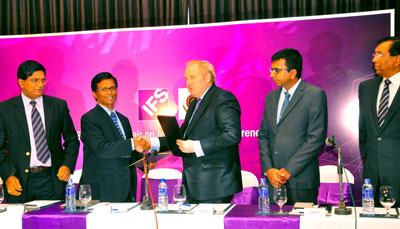Moratuwa University offers courses on evolving disciplines like petrochemicals
View(s):Leading international tech institute, Sri Lanka’s University of Moratuwa has started establishing courses in evolving disciplines such as advanced electronics, petrochemicals, mechatronics and aeronautics, according to the university’s Vice Chancellor Prof. Ananda Jayawardana.
Further, he said that, while courses such as electronic and telecommunication engineering were still the most demanded, due to the high salaries offered, the university had already started labs in areas such as chip design to add value to the local industry.

The agreement being exchanged. Pic by Mangala Weerasekera.
Prof. Jayawardana made these comments at a recent event wherein Swedish IT company IFS, which has a 700-personnel research and development centre in Sri Lanka, signed an agreement with the University of Moratuwa pledging Rs. 18 million to the university, over the next three years, to establish an IFS endowed chair on innovation and entrepreneurship at the university.
Moratuwa University Vice Chancellor said that aeronautics was another new-to-Sri Lanka field that was growing in line with this country’s expanding air transport sector as well as the increase in industry-related professionals it exported. He noted that the university was geared to provide for this field due to the mechanical engineering courses it already offers as well as a number of staff presently getting their doctorates in this area. Prof. Jayawardana additionally revealed that, of the top 10 per cent passing out from the advanced level physical sciences stream (physics, chemistry and mathematics), his university was the first choice of approximately 95 per cent. It also emerged that the university’s engineering discipline took in 800 students a year, more than all of the other faculties in both the public and private sectors combined.
He also said, with regards to “employability”, by the time that students in the university’s engineering and related streams graduated, about 95 per cent were already employed on average across all disciplines, with the lowest employment being in the field of town and country planning where there was 90 per cent employment on graduation.
(JH)


